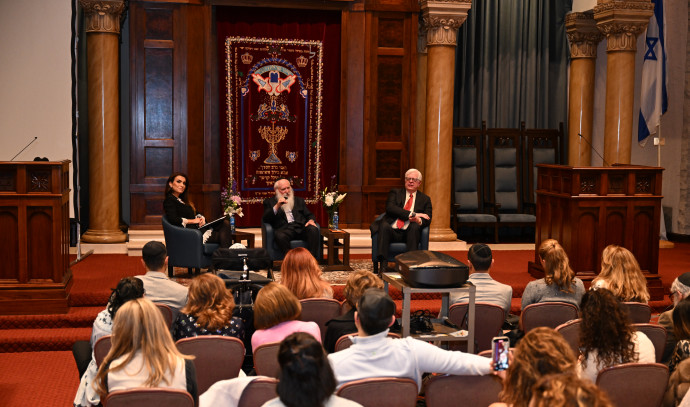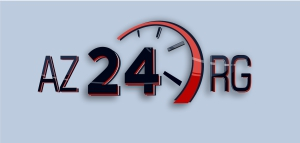Stories of coping with mental health issues after October 7

Almog Meir was one of the lucky ones to be released from the hands of Hamas, only to learn his father, Yossi Meir, had died mere hours earlier.
“He passed away from grief before he could see his son return,” Abram Meir, Almog’s uncle, told The Media Line.
For Almog, the trauma of losing his father is not his only source of despair. Almog recently visited the grave of his best friend, who was killed at the Nova music festival.
“It’s a lot to process. We’re in close communication with his doctors, therapists, and other professionals, but ultimately, the family will be the ones driving his recovery forward,” Meir said.
On the other side of the ocean, in the Sephardic Temple in Los Angeles, the house of worship’s pews were filled with more than 700 people who themselves were suffering from the ongoing Israel-Hamas war.
Shaken by the atrocities happening in Israel and by the extreme surge in antisemitism, they, too, need healing. These are some of the waves of trauma.
October 7 set off an unprecedented psychological distress call that has affected scores of people globally.
Israel is dealing with the psychological stress of more than 100 released hostages, thousands of wounded soldiers, tens of thousands of evacuees from southern and northern border towns, hundreds of grieving families, numerous medical aid workers and hospital staff, and countless individuals throughout the country who wake up to the sounds of warplanes, missiles, and sirens.
Outside of Israel, the entire Jewish world is experiencing echoes of that trauma.
Echos of trauma throughout the Jewish world
Dr. Gil Zalsman, a professor of psychiatry at Tel Aviv University, described the October 7 attacks as worse than September 11 when adjusted for Israel’s population size. In the wake of the attacks, a third of Israel’s population likely needs therapy, he said.
An Israeli child impacted by the waves of trauma. (Courtesy Naomi Shlomo)
“It was a surprise attack that left the population in shock and grief, further straining an already fragile, overcrowded, and understaffed system,” Zalsman, who is also CEO of the Geha Mental Health Center in Petah Tikvah, told The Media Line.
The country’s shortage of mental health workers has led to a vicious cycle in the profession, he explained.
“Increased demand leads to higher stress for those remaining, who then consider leaving as well,” he said. “This could lead to a total breakdown in services,” he explained. He described Israel’s mental health funding as “insufficient and misallocated” even before the war greatly increased the need for mental health services.
Unsurprisingly, Israelis’ mental health appears to be seriously affected by the war.
According to a new report published by Israel’s Ministry of Health, Israel has experienced a surge in post-traumatic stress disorder diagnoses, with estimates ranging from 13,000 to 60,000 individuals potentially affected by the condition.
Calls to mental health hotlines have doubled. Additionally, the use of painkillers and other addictive substances is up by 70% among older adults and people displaced by the war.
When Naomi Shlomo made aliyah from Egypt in 1954, she never in her wildest dreams imagined that she and her husband Shlomo would live in a hotel in the Dead Sea.
The Shlomo family is one of the tens of thousands of Israelis still evacuated from their homes in the north on October 20, and they’ve been living in a hotel in the Dead Sea for nearly a year.
One of three families who have become fixtures, she told The Media Line that no single government or municipal head has reached out to them all these months.
A rocket explosion outside a mini-market in Israel. (Courtesy Naomi Shlomo)
An untold story
No one has heard her story.
“I want to go home,” Shlomo said. “Every Friday, the whole family would get together for Shabbat. I miss my family.”
Shlomo’s two adult sons are still in Kiryat Shmona. One serves in the police, and the other manages the Horshat Tal National Park.
Her grandchildren witnessed a rocket strike on a minimarket in their community and temporarily lost hearing due to the sound of the explosion.
Shlomo said that all the family stress caused her husband to have a heart attack and that the government is not doing enough to handle the situation.
She took out her phone to share extremely disturbing videos with The Media Line. Her 6-year-old granddaughter Ella is in deep trauma over the constant missiles and rocket explosions.
She went on to show another video of her son-in-law, Shmulik Ben Shahar, who stopped by a local mini-market. Shlomo tells The Media Line that her daughter Dorit warned her husband that a siren had just gone off.
As you can see from the photo, his children barely made it inside the market, as the explosion was right outside the entrance door.
Zalsman said that his own well-being has suffered as well. He recounted seeing helicopters from his office window and fearing that the wounded soldier on board might be his son, who is fighting in Gaza.
“It’s frightening,” he said. “You have terrible thoughts. And I see myself as a pretty stable and well-treated person. Think about vulnerable people. Some had anxieties before this war, personality disorders, family problems, marital problems, and financial problems. Then you add the stress of this war, and it can become really bad.”
Israeli health experts and officials have proposed several responses to the mental health crisis.
Officials are calling for enhanced monitoring of psychological conditions such as PTSD, anxiety, and depression.
Public health experts have recommended continuously tracking mental health trends among vulnerable populations—survivors, grieving families, and displaced people—to keep tabs on the long-term effects and to provide timely interventions.
Under the plan, those most affected by the war would be offered targeted mental health services in a streamlined, long-term approach.
Experts have called for mental health programs explicitly aimed at women. With thousands of mostly male reserve soldiers called to serve in the military, many women are left to care for their families alone.
Women whose partners are serving in the reserves report significantly higher rates of anxiety, depression, and disrupted sleep patterns.
The Health Ministry is also working on mental health apps to make psychological assistance more accessible, especially for survivors of trauma.
One such app is currently being broadly rolled out, allowing Israelis affected by the war to access real-time support.
Professionals are urging the Health Ministry to step up early intervention efforts for substance abuse, which is a growing problem, particularly among displaced persons and older adults.
As the government works to increase its mental health efforts, private individuals and organizations are filling the gap.
“If someone is slowly bleeding from their hand, I’ll ask your help even if you don’t know medicine,” Zalsman said. “In an emergency, I’d still ask you to use your shirt to stop the bleeding and help this person. At this point, as we’re handling a mass casualty. You can’t rely solely on expert therapists because there aren’t enough. You need to involve others.”
Zalsman pointed to mental health first aid as an initiative that helps individuals gain tools to support people around them.
“Those with a bachelor’s degree in psychology, social workers, nurses, or people without formal mental health training can get a short course to become mental health first aiders. We’ve done this, and hundreds of people are trained to provide this form of support. It’s not suited for someone with severe PTSD, like a survivor of the Nova festival. But it can help people who are struggling.”
Efforts to increase mental health in Isreal
Americans have also worked to increase access to mental health care in Israel.
When the Lincoln Club of Orange County, a network of conservative donors, was considering ways to help in the wake of October 7, Lincoln Club International Ambassador Benny Mor first thought of raising money to help people suffering from PTSD access therapy.
“But then we realized that technically what Israel needs more than anything else are therapists, and not just to pay for therapy,” Mor told The Media Line. “Israel was lacking post-trauma therapists.”
The Lincoln Club worked with Edna Foa of the University of Pennsylvania and Nathaniel Laor of Tel Aviv University to fund a post-trauma care training seminar at Tel Aviv University. During the five-day seminar, dozens of Israeli therapists were trained in handling trauma.
The Israel Trauma and Resiliency Center, known by its Hebrew acronym NATAL, is another organization responding to the mental health crisis.
On the morning of October 7, just two volunteers were staffing NATAL’s trauma helpline. When the team recognized the severity of the situation, they quickly brought in additional helpline volunteers.
“The calls we got on October 7 were vastly different from the type of calls we typically get on our Helpline,” Ifat Morad, NATAL director of government relations, told The Media Line. “Instead of dealing with the aftermath of trauma, we were getting calls from inside people’s safe rooms, asking for help as their neighbors and family members were being murdered by terrorists. These calls were difficult for our helpline volunteers, as many of them themselves know friends and relatives from the south and have young soldiers fighting, so now we also make sure that our staff is being supported so they can continue supporting so many who need our help.”
NATAL uses a triage approach to prioritize treatment for different groups, including families of hostages, survivors of the Nova music festival, displaced citizens, and military reservists.
“Each group has a multitude of problems,” Morad said. “For example, among the military reservists, one of the groups most affected are male individuals from the Druze community, which has a high rate of IDF enlistment and combat roles. The trauma experienced by Druze veterans is compounded by cultural barriers to seeking help.”
Many of the Druze patients who reached out to NATAL said that Druze men especially struggle to ask for support.
Proportionally, fewer Druze veterans seek mental health support compared to their Jewish counterparts. Druze Israelis staying home while loved ones serve on the front lines are also struggling.
The International Trauma Healing Institute in Israel is also working to support survivors of trauma.The institute developed a set of self-regulation tools called EmotionAid that survivors can use to increase resiliency and reduce stress.
Gina Ross, founder and president of the International Trauma-Healing Institute and co-founder of the Israeli Trauma Center at Jerusalem’s Herzog Hospital, said that the EmotionAid method uses the healing power of the mind-body connection.
“We have access to healing ourselves and helping others around us without needing years of therapy,” she told The Media Line. “We can make sure that the October 7 collective trauma remains an acute stress response and does not develop into a deep trauma. We have the tools, and they can be spread quickly and widely.”
The Ministry of Defense, the military, the police, and the Israeli National Council for PTSD all use Ross’ tools.
“There are not enough therapists trained in cutting-edge trauma healing methods in Israel, but we are offering short training that can teach how to deal with acute stress,” she explained. “The most important thing right now is to explain that there are accessible ways to regulate the nervous system, which will prevent future traumatization.”
Ross’s innovative approach to trauma healing has also caught the attention of those working to address the mental health crisis among Jews outside of Israel.
One such individual is Rona Lalezary, founder of the Mental Health IsReal campaign, who has collaborated with Ross to extend these healing methods beyond Israel’s borders. Lalezary is a life-transformative coach who doesn’t consider herself an influencer. She posted about the impact of atrocities around Oct. 7 on social media and never anticipated that tens of thousands of people would respond.
However, as she worked closely with experts like Ross, it became evident that diaspora Jews were also grappling with a profound sense of trauma and isolation.
“People told me nobody in Los Angeles wants to admit they’re struggling, but I knew my community needed this,” Lalezary said of planning the campaign’s first event, which 700 community members attended.
Initially focused on providing support within Israel, Lalezary quickly realized the immense need for mental health resources abroad. She recruited trauma specialists, including Ross, a well-known figure in Israeli trauma recovery.
Ross, who has worked extensively with the IDF, police, and other Israeli organizations, brought a strategic approach to Lalezary’s efforts, emphasizing the importance of addressing the collective trauma affecting Jews worldwide.
Lalezary explained to The Media Line, “The needs of the diaspora Jewish community have not been addressed. There is a loneliness that is felt among diaspora Jews where not only do they feel like they’re alone because their peers have turned against them, but in many, many cases, their mental health providers… have used their therapy sessions to attack Israel to attack them as Jews.”
The first major event featured prominent figures like Dennis Prager and Rabbi Manis Friedman, who addressed both the mental and spiritual needs of Jews reeling from the recent trauma. “Dennis is big on clarity,” Lalezary explained, emphasizing how Prager’s insights helped contextualize the crisis in the broader history of the Jewish people.
Meanwhile, Rabbi Friedman provided spiritual guidance, speaking to the soul and exploring where faith fits into the struggle. This combination of mental and spiritual support resonated deeply, drawing attention from Jewish communities around the world and sparking a new chapter in Rona’s outreach efforts.
Lalezary explained that her personal history has profoundly shaped her mission. Born in Iran, she witnessed her family lose everything when they fled the country, and she watched her father start over in the United States, learning English and retaking his medical boards at an age when most of his peers were retiring.
“I always wondered what it felt like for my parents to face the decision to leave everything behind,” she reflected. “And when you see what’s happening now, it’s all too familiar.”
This partnership between Lalezary and Ross focuses on creating virtual platforms and mental wellness hubs for Jewish communities worldwide. Mental Health IsReal intends to establish mental health hubs in major Jewish communities such as New York, Toronto, Montreal, Sydney, Melbourne, and Mexico City.
Additional programs target specific populations affected by the war. A recent initiative by the Ministry of Aliyah and Integration, the Jewish Agency, the Merage Foundation Israel, and the Dubek Foundation brought together “lone reservists”—soldiers who made aliyah but whose families were still abroad—for a weekend of healing and mindfulness in Cyprus.
The challenges of lone soldiers
Lone soldiers face unique challenges such as distance from their families. Aaron Amar Rothstien, who made aliyah from Colombia, told The Media Line that he spent months “without work and without a fixed home.”
Many of the lone soldiers also experienced serious trauma since October 7. Natan, who made aliyah at age 18 from São Paulo, Brazil, was severely injured in Gaza when a booby-trapped building exploded beside him and his unit.
“It’s hard to explain how you feel in that moment,” Natan told The Media Line. “My first reaction wasn’t exactly fear, like the fear of dying, but more the shock of something happening out of nowhere, and you don’t understand what’s going on.”
Helping promote resilience doesn’t always mean talk therapy or teaching coping skills. Israel’s branch of Engineers Without Borders (EWB) has shifted its efforts to supporting Israeli soldiers who were blinded or lost a limb since October 7 by making their homes accessible to their needs.
Michal Dolev Hashimshony, the CEO of EWB Israel, noticed that wounded soldiers often faced “severe emotional stress” when they returned to homes that were not set up to accommodate them.
“Imagine a soldier, once strong and heroic, returning home only to have their mother carry them to the bathroom,” she said.
“With thousands of wounded soldiers, it won’t be feasible to simply keep them from returning home due to unprepared living conditions. They have to go home and take care of themselves even if their homes are completely unprepared to accommodate them,” she explained.
After announcing that it would help wounded soldiers renovate their homes, EWB Israel received 540 responses within 24 hours—requests for help, offers to volunteer, and donations.
As for Shlomo, she sees the pressure of the shock waves of stress throughout her country but has run out of answers.
She tells The Media Line: “Everybody is in trauma. The entire country is in trauma,” she said. “I worry about my daughter and her four children. If anyone can help, I am embarrassed to ask. I don’t know what I can do for my children. I can’t give anymore.”
For those looking to offer assistance to these organizations, please contact (email protected).




